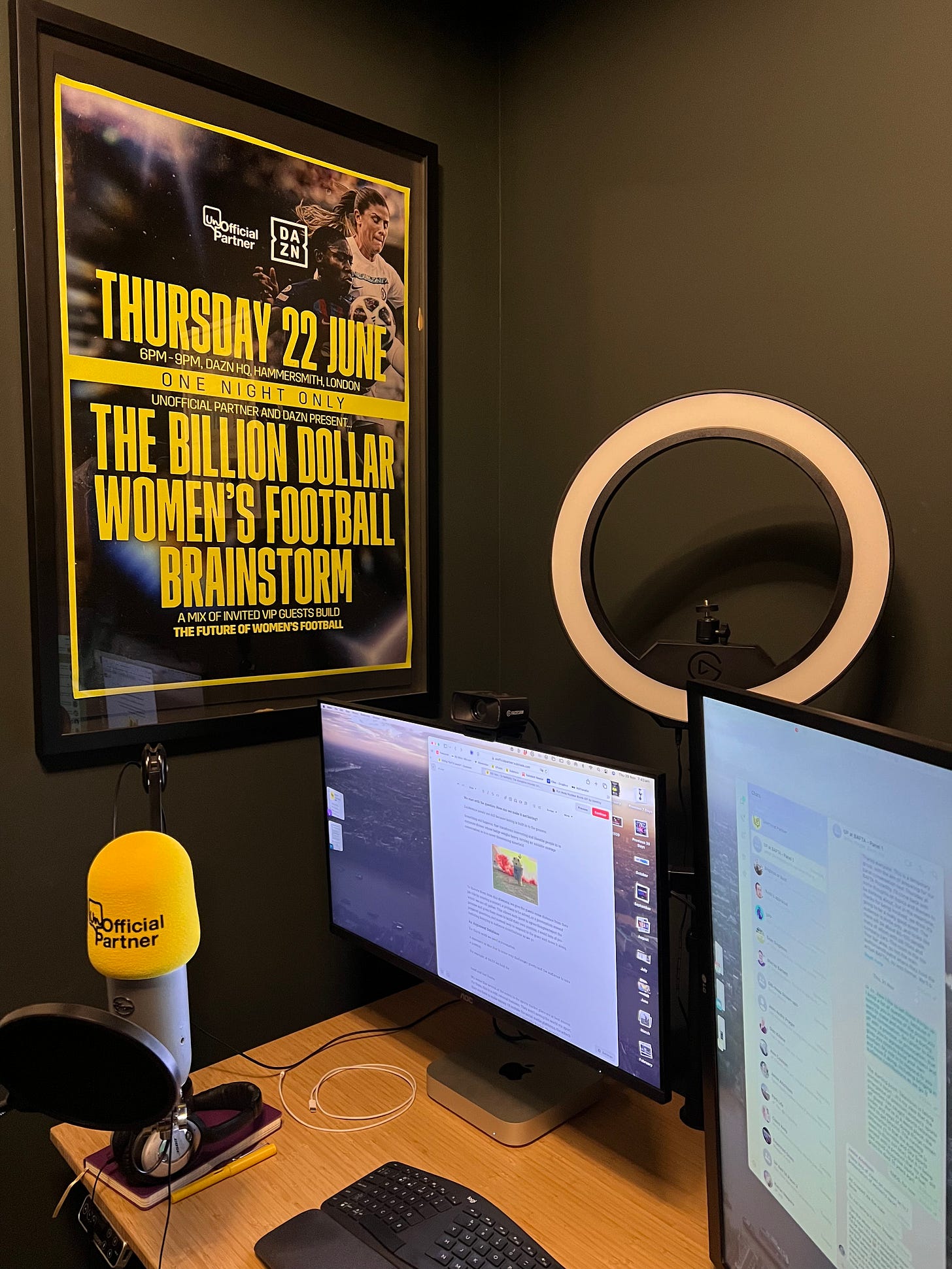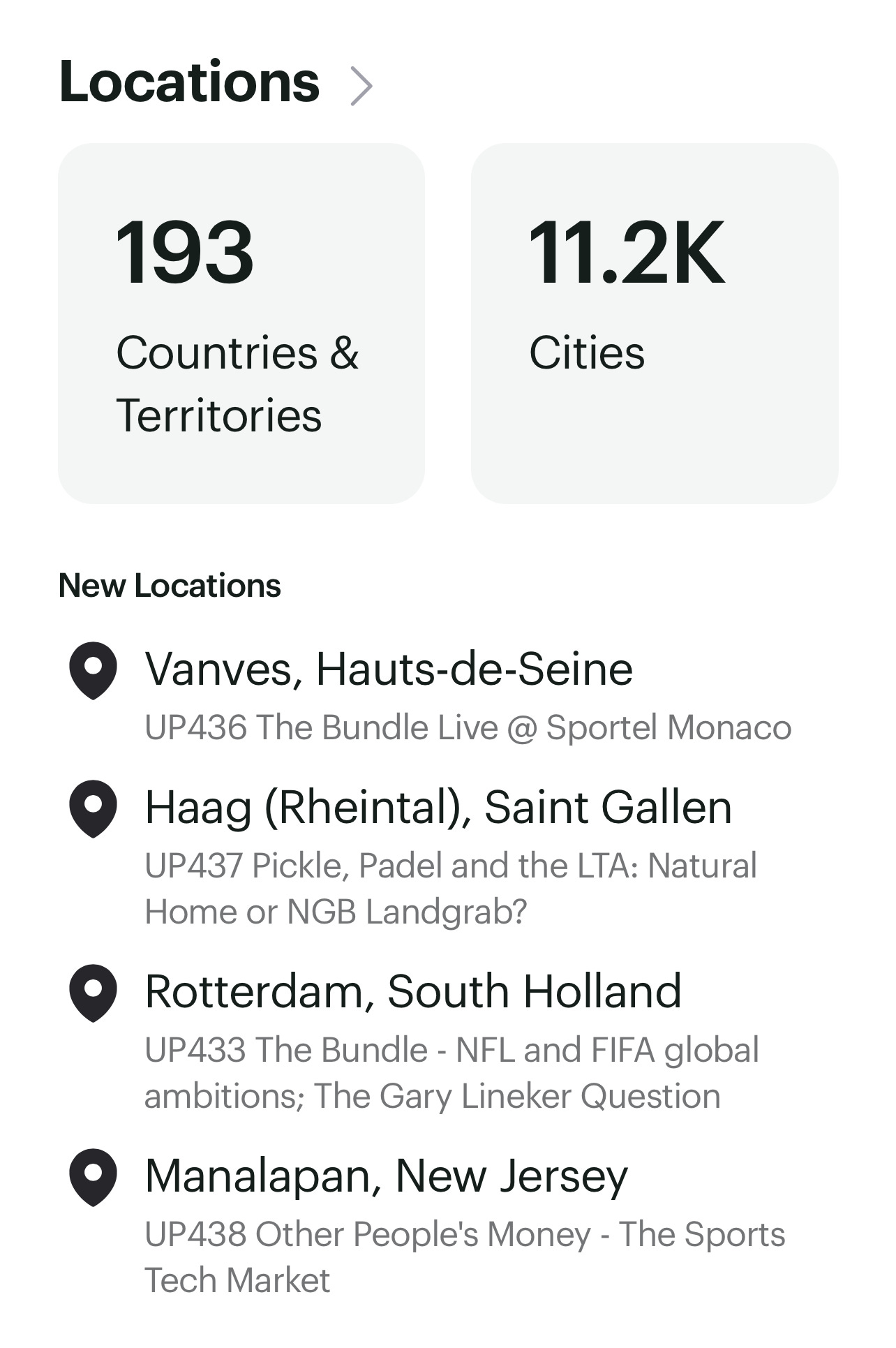This newsletter is sponsored by Redtorch, a research & creative agency that’s been at the heart of sport and fitness for over 20 years.
We all know the value of research that produces usable insights and creative that’s actually effective. But with so many agencies to choose from, how are we supposed to know which is the right one for us?
Redtorch makes the choice easy.
Independent, friendly and highly qualified, they’re trusted and retained by many of the world’s biggest sports and fitness organisations because they offer everything you’d expect from a specialist agency: unmatched flexibility, the best people, a constant stream of innovative ideas.
Visit www.redtorch.sport to learn more.
BAFTA, darling
Big night tonight, as UP plays BAFTA in London’s busy West End.
The occasion is the UK launch of Host Broadcast Services, or HBS.
We’re doing a live podcast in front of 100 invited guests.
So that’s where my head is as I write this week’s newsletter.
How does it work?
We invite a succession of smart people to solve a problem, live on stage.
The evening is recorded, edited and subsequently published as an Unofficial Partner podcast. The tone is informal and - whisper it - fun.
We’ve arrived at a particular way of running this type of evening, which I’m happy to share.
We start with the question: How can we make it not boring?
Conference panels are dull because boring is built in to the process.
Something odd happens, that transforms interesting and likeable people in to corporate drones whose badge weighs heavy, turning an amiable onstage conversation in to a career threatening minefield.
To liberate them from this dilemma, we give the guests some distance from their job title by creating a conceit, a problem to be solved, or a provocation around which we can all gather. This allows each guest to agree/disagree/reject the premise and gives them room to build their own position. I avoid lists of pre-prepared questions, and instead seek to respond to the guest and move it along, including bringing in audience contributions as we go.
For this to work we need a provocation.
A statement or idea that in some way challenges guests and the audience to take a position.
For example, at DAZN we held the Billion Dollar Women’s Football Brainstorm. The initial provocation was my proposal for an IPL of Women’s Football, a global closed franchise league of the best teams with the best players.
About 80% of the room hated it, but it got us moving in terms of airing the opportunities and threats facing the women’s game, many of which remain in place, two years on.
My Argument Database
After thirty or so events, and nearly 450 podcasts in five years, I’ve heard a lot of points of view on the business of sport.
You become hyper aware of tropes, or lines of argument.
In fact, you start to collect them. (Side note: I’m addicted to note taking apps and have wasted many hours searching for the perfect place to manage my argument database or ‘second brain’, a journey that has taken me through the Zettelkasten method and in to Obsidian, Notion and Airtable to name just a few. Be warned, rabbithole doesn’t cover it)
Here are some sports biz provocations you can cut out and keep.
The sports marketing industry is the cause of obesity not the solution.
Necessary Evil is the best a sponsor can hope for.
The American betting market is a honey trap not a gold rush.
Kings League is this year’s Drive to Survive.
Organisational memory is the most underrated element of corporate decision making (eg. The ECB created The Hundred because the previous regime bungled the monetisation of Twenty20, or Sky are not going to save rugby because they were disrespected by the sport’s jump to BT ten years ago - listen to The Bundle this week for more on this).
And on we go.
Each provocation is just a route in to a conversation, and a chance to hold the arguments up to the light.
Tonight’s event has two threads.
Sports media is failing women’s sport
Knife to a gunfight: What is sport in the age of scroll addiction?
Argument as commodity
This newsletter, like the blog before it, is where I rehearse the arguments in public, with a bias towards questions over answers.
This process is useful to me personally, as it forces me to think a bit harder about a particular issue, and encourages me to go and look for the various arguments that are out there circulating at any one time.
This process has evolved over time because it suits me, psychologically. By that I mean, I’m not a naturally combative or competitive person. I tend to run from conflict and hold very few fixed opinions on anything much beyond a core left-liberal bias. I used to think this was a character weakness but then you meet people with fixed views, who are trapped in a particular position and can’t escape, because they think their reputation is based on it, and they get stuck in a loop, repeating the same basic points in different guises, trying to build wake-up-its-five-to-midnight jeopardy that becomes predictable and boring.
The counter risk is complacency, which is the one I run, and the incentive to turn every issue in to a commodity from which to generate clicks for opinions.
Having an argument database is useful in this regard. The act of writing them down strips them of emotion and you get to the nub of a particular issue quite quickly, and you come to realise how much duplication and cross-over there is.
Most news stories are anything but new.
Good and Bad Faith
It comes down to trust in the end.
Do you trust those who call for disruption? Are they doing it for the right or wrong reasons? What are the right and wrong reasons? And does it matter, as in do the ends justify the means?
My starting point, or my prior bias, is captured by this Galbraith quote:
The modern conservative is engaged in one of man's oldest exercises in moral philosophy; that is, the search for a superior moral justification for selfishness.
With that in mind, you wouldn’t expect me to love the current vogue for demonising government, epitomised by Musk and Ramaswamy’s DOGE, which seeks 75% cuts to the federal workforce.
The same impulse is alive and well in the sport biz microcosm.
There are plenty of people who want to burn down the NGBs, OlympicWorld and the powerful football federations.
I can see plenty of evidence of government waste and bad decisions.
But do I trust the motives of the disruptors? And if they’re right, does it matter?
My view is that some of the actors in the sports market place are, at best, amoral.
For them, this is a cold, rational business. They aren’t saving the world via sport, they’re here to make money. I’d include the social media platforms, the adtech industry and private equity groups in that particular bucket. They pride themselves on reacting to the world as it is not the world we want to live in.
This gets us to a good question, which is: what do we know that works for certain?
If the incentives are to grow an audience, how would we do it if our lives depended on it?
I’d start with sex and gambling, and work back from there.
So we get to decisions on a micro basis every day around the business of sport - The Good and Bad Routes to Audience Growth…
I’ll put it in the database.
Condensed Scott Galloway on F1
“The mood in Vegas this year is subdued. A bit chastened even.
For starters, the business face of all this success, Maffei, is out. His contract expires at the end of this year, and Liberty announced he'll be leaving, to be replaced temporarily by Chairman John Malone. Malone is brighter than me, but that won't stop me from making the following assertion.
He retired slash fired the wrong guy. Maffei has doubled Liberty's shareholder value in the past 12 months, and received comp averaging $25 million per year. David Zaslov has been paid an average of $115 million for the last three years to destroy two-thirds of Warner Brothers Discovery's shareholder value.”
From The Prof G Pod with Scott Galloway: No Mercy / No Malice: F1 Is at an Inflection Point, 23 Nov 2024
Wait, is that bottom of the barrel we just glimpsed?
How did this bit get through an editorial meeting and on to an actual screen?
The absolute fucking state of this…
Welcome to our new UP listeners
Thanks for reading.
Share this newsletter with your friends and family.
And finally…
Now click the Fucking Like Button, I Mean How Fucking Hard Can It Fucking Be????
It’s the heart shaped thing below, you fucking bell end. It’s the lowest form of human-to-internet engagement and for reasons we don’t quite understand helps us appear more popular with people who don’t yet receive the newsletter, most of whom are of no value in and of themselves, but who collectively add to the story that this newsletter is popular among a group we’ve started to call industry insiders.
We’re grateful for your help in this matter.
(Btw, when I put this sweary bit in the newsletter, it increases Likes by about 75%…some people just liked to be bullied I guess).








Great!